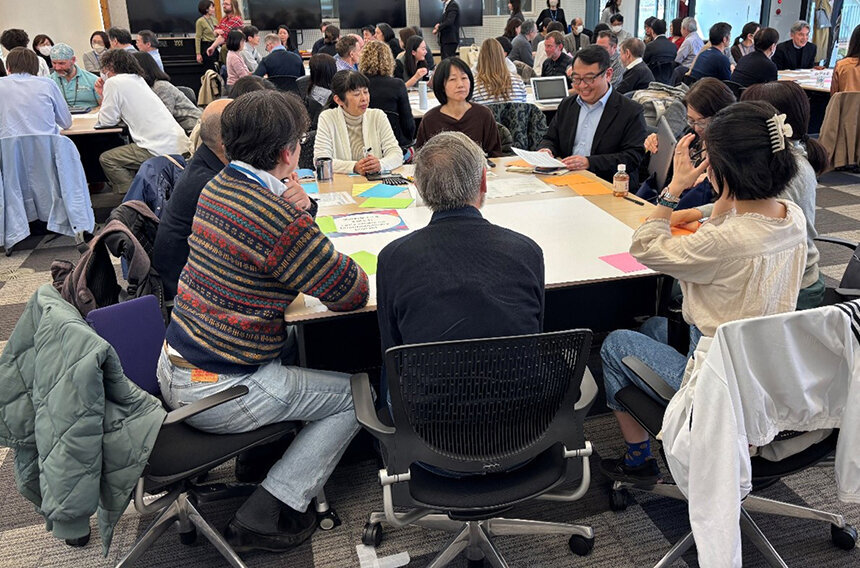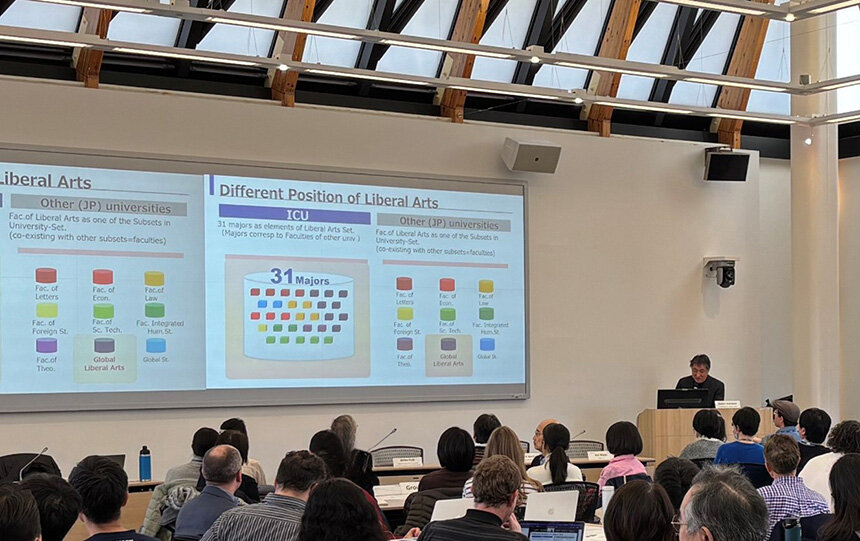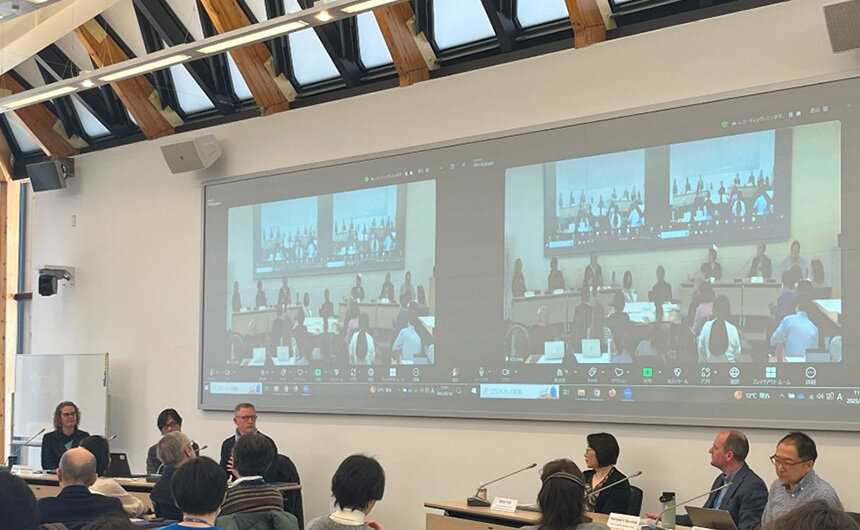NEWS
2024 Faculty Retreat Held
Update: March 12, 2025

On Friday, February 28, 2025, the 2024 Faculty Retreat was held at the Kiyoshi Togasaki Memorial Dialogue House International Conference Room.
At ICU, the Faculty Retreat is an annual training session held as part of Faculty Development (FD), bringing together all teaching staff. This year, the event was conducted entirely in person, with Vice President for Academic Affairs (hereinafter, "VPAA") Robert Eskildsen serving as the moderator, and participation from approximately 120 faculty and staff members. The theme for this year was "Liberal Arts for Tomorrow," featuring presentations, panel discussions, and group discussions.
After a prayer and opening remarks by the VPAA, the event began with a keynote speech by President Iwakiri (hereinafter, "the President").

Keynote Speech by the President
The President shared how he presents ICU's image to the public at events like open campuses. He first explained that the name "Arts and Sciences," which describes ICU's specialty, represents both "Science" - the pursuit and discovery of the unknown - and "Art" - the techniques and scholarship needed to shape new, unformed ideas into something shareable. He also described ICU's 31 majors and programs in language, physical education, and other disciplines as essential elements of the liberal arts framework, emphasizing that faculty members share the mission of cultivating each individual student into "A Specialist with a Universal Mind" who is capable of integrating these elements. Lastly, he expressed his hope that this retreat would serve as a step toward making ICU's unique characteristics even more compelling.
After the keynote speech by the President, three faculty members gave presentations raising key issues on three topics.
- "Creating Interdisciplinary Courses" (Associate Professor Rekishu Yamazaki, Department of Natural Sciences)
Professor Yamazaki began by emphasizing that understanding the essence of complex problems in modern society requires a multifaceted perspective and interdisciplinary learning. He then shared strategies for fostering interdisciplinary thinking and deep knowledge acquisition in students, introducing his team-teaching courses and his experiences delivering guest lectures in various classes. Finally, he encouraged faculty members to take advantage of ICU's abundant interdisciplinary resources and to broaden their experiences by engaging with different fields, people, and topics. - "How to Teach Specialized Subjects to Diverse Students" (Assistant Professor Janet Borland, Department of History)
Professor Borland presented her approach to teaching history, her specialization, to students from diverse backgrounds. Using a historical document as an example, she demonstrated how simple initial questions can spark curiosity, also explaining how brainstorming different perspectives encourages student interaction for further learning among her efforts to teach classes where people can learn from each other. Additionally, she stressed the importance of understanding individual students, not just in terms of teaching subject-specific knowledge, but also in equipping them with fundamental, valuable skills for their careers and future lives. - "Effective Supervision of Interdisciplinary Graduation Research" (Senior Associate Professor Christopher Bondy, Department of Society, Culture & Media)
Professor Bondy discussed his approach to supervising graduation research across various disciplines beyond his expertise in sociology. He highlighted challenges such as differences in knowledge, methodologies, citation styles, and evaluation criteria across fields. Based on his own teaching experience, he emphasized that an instructor's key role in interdisciplinary research is to support the students' passion, ask thought-provoking questions, and share the joy of learning. Additionally, he suggested expanding capstone project options beyond traditional thesis writing, so that they could also include internships and creative graduation projects that integrate hands-on experience.
Following the presentations, a panel discussion was held, moderated by Professor Nasu. In addition to the three presenters, Associate Professor Akiko Fujii (Department of Education & Language Education) and Instructor Matthew F. Kershaw (English for Liberal Arts Program) joined the discussion, engaging in a Q&A session and exchanging opinions on each topic.

Photo of the Panel Discussion
In the subsequent group discussion, participants were divided into 11 groups that focused on one of the three topics, engaging in a free and lively exchange of ideas. At the end of the group discussion, participants shared the new perspectives and ideas that emerged during their discussions by writing them down on Post-it notes and affixing them to posters. During the following feedback session, participants had the opportunity to freely exchange thoughts while viewing the contributions of each of the groups.
To conclude, the Dean of the College of Liberal Arts, Professor Ikoma, encouraged participants to apply the unique ideas and perspectives generated during the retreat to their teaching and advising.
Participants shared the following feedback about the retreat:
- "Building interdisciplinary courses requires human networks, so the retreat, including the lunch session, was a valuable opportunity."
- "The faculty presentations were incredibly insightful, and discussing new interdisciplinary course ideas with colleagues was exciting."
- "This was a fantastic opportunity for a discussion where many faculty members actively contributed their diverse opinions."
This Faculty Retreat provided each participant with a deeper understanding of ICU's essence and a meaningful opportunity to reflect on the idea of "Liberal Arts for Tomorrow." It was a fulfilling and productive event, with promising outcomes that can be passed on to students.
